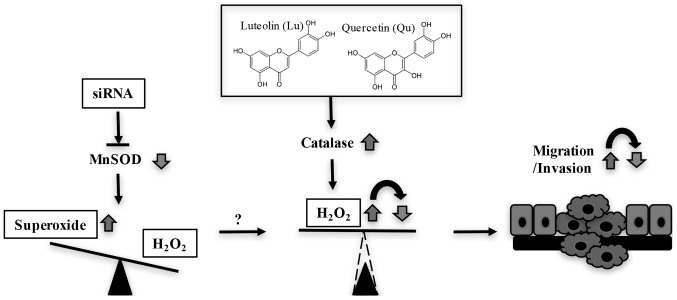
 中央研究院 生物化學研究所
中央研究院 生物化學研究所
Reactive oxygen species (ROS) homeostasis is maintained at a higher level in cancer cells, which promotes tumorigenesis. Oxidative stress induced by anticancer drugs may further increase ROS to promote apoptosis, but can also enhance the metastasis of cancer cells. The effects of ROS homeostasis on cancer cells remain to be fully elucidated. In the present study, the effect of a reduction in manganese superoxide dismutase (MnSOD) on the migration and invasion of A431 cells was investigated. Our previous micro‑assay data revealed that the mRNA expression of MnSOD was higher in the invasive A431‑III cell line compared with that in the parental A431 cell line (A431‑P). In the present study, high protein levels of MnSOD and H2O2 production were observed in A431‑III cells; however, catalase protein levels were significantly lower in A431‑III cells compared with those in the A431‑P cell line. The knockdown of MnSOD increased H2O2 levels, enzyme activity, the mRNA levels of matrix metalloproteinase‑1, ‑2 and ‑9, and the migratory and invasive abilities of the cells. Inducing a reduction in H2O2 using diphenyleneiodonium (DPI) and N‑acetyl‑l‑cysteine decreased the migratory abilities of the cell lines, and DPI attenuated the migratory ability that had been increased by MnSOD small interfering RNA knockdown. Luteolin (Lu) and quercetin (Qu) increased the expression of catalase and reduced H2O2 levels, but without an observed change in the protein levels of MnSOD. Taken together, these data suggest that reduced MnSOD may induce ROS imbalance in cells and promote the metastatic ability of cancer cells. Lu and Qu may attenuate these processes and may be promising potential anticancer agents.
